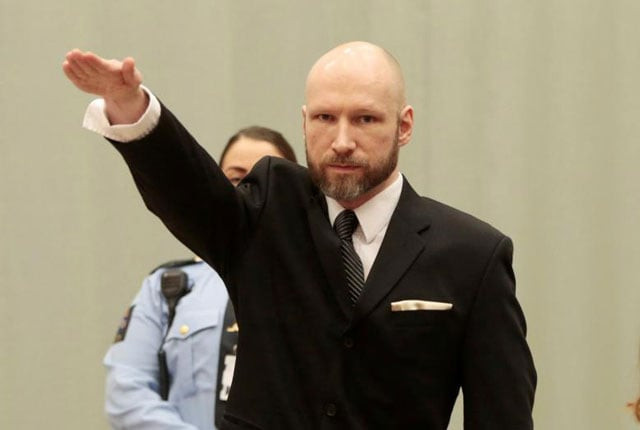Mass killer Breivik loses human rights case against Norway
Breivik, an anti-Muslim neo-Nazi, detonated a bomb in Oslo in July 2011 that killed eight people

Anders Behring Breivik raises his right hand during the appeal case in Borgarting Court of Appeal at Telemark prison in Skien, Norway, 10 January 2017. PHOTO: REUTERS
Breivik, an anti-Muslim neo-Nazi, detonated a bomb in Oslo in July 2011 that killed eight people. He then gunned down 69 people, many of them teenagers, at a meeting of the youth wing of the then-ruling Labour Party. "The Borgarting Court of Appeal has determined that Anders Behring Breivik is not, and has not been, subjected to torture or inhuman or degrading treatment," the court said in a statement.
Strict conditions for Breivik, who has no contact with other inmates and has not repented for the attacks, were justified because there was a "high risk" that he would use violence in future and because other prisoners might attack him, it said. A lower Oslo court had ruled in 2016 that the conditions, including frequent strip searches, violated a ban on "inhuman or degrading treatment" under the European Convention on Human Rights.
Survivors and relatives of the 77 dead welcomed Wednesday's verdict after denouncing last year's ruling as a perversion of a Convention that starts with the sentence "everyone's right to life shall be protected by law". "We're very relieved," Lisbeth Roeyneland, head of the main support group, told Reuters. "I hope we don't hear any more about that terrorist for many, many years."
Breivik makes Nazi salute at court appearance
Breivik is serving Norway's longest sentence, 21 years, which can be extended if he is still considered a threat.
Appeal
Breivik's lawyer Oeystein Storrvik expressed surprise at the verdict and said he would appeal to Norway's Supreme Court. If that fails, Breivik can appeal to the European Court of Human Rights. But the Norwegian Supreme Court generally only accepts cases that raise wider issues of legal principle. "The window is more narrow," Ina Stroemstad, a district court judge, told Reuters.
The appeals court noted that Breivik lives in a three-room cell and can watch television and read newspapers and that limited contact with other inmates was under consideration. At a March 2016 hearing in the district court, Breivik had said he was feeling bad in jail, complained about cold coffee and grumbled that jail food was "worse than waterboarding".
But the appeals court heard in January that he wrote a "thank you" note to his guards after the lower court hearing, saying he did not mean to seem critical. The appeals court also upheld a finding by the lower court that restrictions on Breivik's letters and visitors were justified. Breivik's only family visitor was his mother, who gave him a hug shortly before she died in 2013.



















COMMENTS
Comments are moderated and generally will be posted if they are on-topic and not abusive.
For more information, please see our Comments FAQ